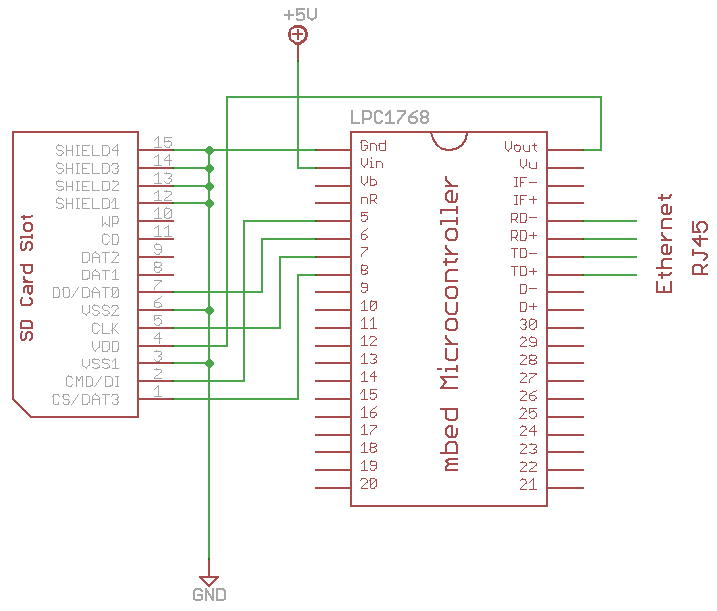This is an example code for using the TFTPServer library.
Fork of TFTPServerTest by
A simple TFTP server built with the TFTPServer library
In this example a FAT formatted SD card is connected to the MBED board to provide a storage place for a TFTP server. This will allow us to upload files to or download files from the TFTP server (SD card) over an Ethernet connection as well as to use the files uploaded to the TFTP server in a program running on the MBED board.
Schematic

We can use for example the SD Formatter utility to format an SD card for the FAT file system .
NOTE: In the commands below substitute 192.168.1.185 with the actual IP address of your TFTP server. It's printed to the serial terminal of the connected PC during the server start up.
To upload or download files from a MS Windows PC we can use the TFTP client utility as follows:
- To upload for example the
test.txtfile to the TFTP server:
- Open a command prompt in the folder the file is located in.
- Type
tftp 192.168.1.185 put test.txt /fs/test.txtand hit ENTER
- Open a command prompt in the folder the file is located in.
- To download for example the
test.txtfile from the TFTP server:
- Open a command prompt in the destination folder.
- Type
tftp 192.168.1.185 get /fs/test.txt test.txtand hit ENTER
- Open a command prompt in the destination folder.
A similar built-in TFTP client is available also on MAC and Linux operating systems.
References:
- The Trivial File Transfer Protocol (TFTP)
- RFC 1350 - The TFT Protocol
- LaOS (The Laser Open Source) project
Diff: main.cpp
- Revision:
- 2:228ce0f5c9c8
- Parent:
- 1:698437bcd48d
- Child:
- 3:77497b352c3f
--- a/main.cpp Fri Mar 16 19:28:34 2018 +0000
+++ b/main.cpp Fri Mar 16 19:34:42 2018 +0000
@@ -54,7 +54,6 @@
{
// Try to mount the filesystem. This should work without the Ethernet.
pc.printf("Mounting the filesystem... \r\n");
-// fflush(stdout);
int err = fs.mount(&bd);
pc.printf("%s\r\n", (err ? "Failed :(\r\n" : "OK\r\n"));
@@ -64,7 +63,6 @@
// Open a file. This should work without the Ethernet, too.
pc.printf("Opening \"/fs/test.txt\"... \r\n");
-// fflush(stdout);
FILE* fp = fopen("/fs/test.txt", "r+");
pc.printf("%s\r\n", (!fp ? "Failed :(\r\n" : "OK\r\n"));
@@ -73,8 +71,7 @@
{
// Create the test file if it doesn't exist
pc.printf("No file found, creating a new file ...\r\n");
-// fflush(stdout);
- fp = fopen("/fs/test.txt", "w+");
+ fp = fopen("/fs/test.txt", "w+");
pc.printf("%s\r\n", (!fp ? "Fail :(" : "OK"));
if (!fp)
error("error: %s (%d)\r\n", strerror(errno), -errno);
@@ -82,7 +79,6 @@
for (int i = 0; i < 10; i++)
{
pc.printf("\rWriting numbers (%d/%d)... ", i, 10);
-// fflush(stdout);
err = fprintf(fp, " %d\n", i);
if (err < 0)
{
@@ -94,7 +90,6 @@
pc.printf("\rWriting numbers (%d/%d)... OK\r\n", 10, 10);
pc.printf("Seeking file ...\r\n");
-// fflush(stdout);
err = fseek(fp, 0, SEEK_SET);
pc.printf("%s\r\n", (err < 0 ? "Fail :(" : "OK"));
if (err < 0)
